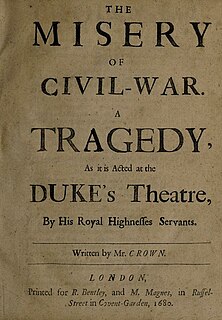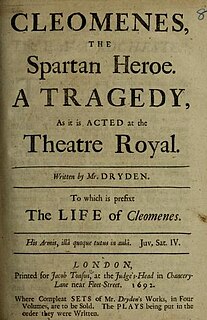Related Research Articles
The Royalist is a 1682 comedy play by the English writer Thomas D'Urfey. It was staged at the Dorset Garden Theatre by the Duke's Company, shortly before the merger that created the United Company. It is set during the Commonwealth Era following the English Civil War.

Epsom Wells is a 1672 restoration comedy by the English writer Thomas Shadwell. It was the first in a line of plays set in spa towns. The incidental music was composed by Nicholas Staggins. In the 1690s Henry Purcell scored a new staging of the play. It was performed at the Dorset Garden Theatre by the Duke's Company. The cast included Henry Harris as Rains, Thomas Betterton as Bevil, William Smith as Woodly, Cave Underhill as Justice Clodpate, Anne Gibbs as Lucia, Mary Betterton as Mrs Jilt, James Nokes as Bisket and Edward Angel as Fribble.
The Adventures of Five Hours is a 1663 comedy play by the English writer Sir Samuel Tuke, 1st Baronet. Based on the play Los empenos de seis horas by Antonio Coello, It is an early example of the developing Restoration comedy tradition. Its success led to a series of sentimental plays in the Spanish style about love and honour, very different to the more sophisticated and cynical comedies which the Restoration era became known for.
The Slighted Maid is a 1663 comedy play by the English writer Robert Stapylton.

Cambyses, King of Persia is 1671 tragedy by the English writer Elkanah Settle. It was staged by the Duke's Company at the Lincoln's Inn Fields Theatre in London. The original cast included Thomas Betterton as Cambyses, Henry Harris as Prexaspes, John Crosby as Otanes, William Smith as Darius, Henry Norris as Artaban, Matthew Medbourne as Smerdis, Samuel Sandford as Parasithes, John Young as Theramnes, Mary Betterton as Mandana, Elinor Dixon as Orinda and Jane Long as Osiris.
The Country Wit is a 1676 comedy play by the English writer John Crowne, part of the tradition of Restoration Comedy. It was first staged at the Dorset Garden Theatre in London by the Duke's Company. The cast included Samuel Sandford as Sir Thomas Rash, Thomas Betterton as Ramble, James Nokes as Sir Mannerly Shallow, Henry Harris as Merry, Cave Underhill as Booby, Matthew Medbourne as Lord Drybone, Anthony Leigh as Rash, Mary Betterton as Lady Faddle, Mary Lee as Christina, Elizabeth Currer as Betty Frisque and Elinor Leigh as Isabella.
Alcibiades is a 1675 tragedy by the English writer Thomas Otway, based on the life of the Athenian statesman and general Alcibiades. Staged by the Duke's Company, it premiered at the Dorset Garden Theatre in London with a cast that featured Thomas Betterton as Alcibiades, Matthew Medbourne as Agis, Samuel Sandford as Tissaphernes, John Crosby as Patroclus, Henry Harris as Theramnes, Thomas Gillow as Polyndus, Mary Lee as Deidamia, Mary Betterton as Timandra and Elizabeth Barry as Draxilla.
The Stepmother or The Step-Mother is a 1663 tragicomedy by the English writer Robert Stapylton. It was first staged by the Duke's Company, premiering at the Lincoln's Inn Fields Theatre.
Juliana; Or, The Princess Of Poland is a 1671 tragedy by the English writer John Crowne. It was originally staged by the Duke's Company at the Lincoln's Inn Fields Theatre in London.

The Misery of Civil War is a 1680 tragedy by the English writer John Crowne. It was originally staged by the Duke's Company at the Dorset Garden Theatre in London. The play was staged at the height of the Popish Plot, something Crowne addressed in his prologue. Although he states that "by his feeble skill 'tis built alone, The Divine Shakespeare did not lay one Stone" the plot in fact drew heavily on Henry VI, Part 2 and Part 3
The Massacre of Paris is a 1689 tragedy by the English writer Nathaniel Lee. It was first staged by the United Company at the Theatre Royal, Drury Lane. It is based around the 1572 St. Bartholomew's Day massacre which led the killing of many Huguenots during the French Wars of Religion. The events had previously been portrayed in Christopher Marlowe's Elizabethan play The Massacre at Paris.

The Empress of Morocco is a 1673 tragedy by the English writer Elkanah Settle. It was originally staged by the Duke's Company at the Dorset Garden Theatre in London. The cast included Henry Harris as Muly Labas, William Smith as Muly Hamet, Thomas Betterton as Grimalhaz, Matthew Medbourne as Hametalhaz, John Crosby as Abdelcador, Mary Betterton as Laula and Mary Lee as Mariamne. The published version was dedicated to Henry Howard, Earl of Norwich.
The Siege of Babylon is a 1677 tragedy by the English writer Samuel Pordage. It was originally staged at the Dorset Garden Theatre by the Duke's Company.

Theodosius; Or, The Force Of Love is a 1680 tragedy by the English writer Nathaniel Lee. It was first staged by the Duke's Company at the Dorset Garden Theatre. It takes place during the reign of the Roman Emperor Theodosius II. Incidental music for the play was composed by Henry Purcell.
The Destruction of Troy is a 1678 tragedy by the English writer John Banks. It was first staged by the Duke's Company at the Dorset Garden Theatre in London. It depicts the Trojan War as inspired by Homer's Iliad.

Love Triumphant; Or, Nature Will Prevail is a 1694 tragicomedy by the English writer John Dryden. It was Dryden's final stage play.

Circe is a 1677 tragedy by the English writer Charles Davenant. It was first staged by the Duke's Company at the Dorset Garden Theatre in London. The play's music was composed by John Banister.

Troilus And Cressida; Or, Truth Found Too Late is a 1679 tragedy by the English writer John Dryden. It was first staged by the Duke's Company at the Dorset Garden Theatre in London. It was a reworking of William Shakespeare's 1602 play Troilus and Cressida, set during the Trojan Wars. In acknowledgement of this Dryden has the prologue spoken by Shakespeare's ghost, defending the alterations made to the play.

Sir Salomon; Or, The Cautious Coxcomb is a 1670 comedy play by the English writer John Caryll. It has often been staged under the title Sir Solomon Single. It was first performed by the Duke's Company at the Lincoln's Inn Fields Theatre in London. It is part of the tradition of Restoration comedy.

Cleomenes, the Spartan Hero or Cleomenes, The Spartan Heroe: A Tragedy is a 1692 tragedy by the English writer John Dryden. It was first staged at the Theatre Royal, Drury Lane by the United Company. It portrays the reign of Cleomenes, the King of Sparta, inspired by Plutarch's history of the period. Dryden's version is strongly Jacobite in drawing parallels from his overthrow to the recent Glorious Revolution in England. Because of this it was temporarily banned by the authority of Queen Mary.
References
- ↑ Van Lennep p.252